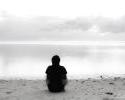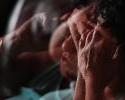Researchers estimate at least ten percent of those with bipolar disorder have OCD as well. Many individuals with both diagnoses indicate that their OCD symptoms developed first.
For a clinical diagnosis of either OCD or bipolar disorder, the symptoms must be persistent and intense enough to disrupt normal daily functioning.
Bipolar Disorder: Depression and Mania
Bipolar disorder is a mental health issue characterized by moods that alternate between depression and mania. Most of us know that depressive symptoms include fatigue, sadness, lethargy, insomnia, a sense of hopelessness, and sometimes suicidal thoughts.
Mania, or a manic mood, is an expansive, elevated, and sometimes irritable state of mind that persists for a week or more. Manic individuals can be extremely talkative, have racing thoughts, be distracted, or intensely goal-directed. Their sense of worth is inflated, sometimes grandiose, and their behavior is frequently impulsive and/or risky—with potentially painful consequences.
Bipolar I disorder is a severer subtype because both the manic and depressive symptoms are extreme. Depression is usually intense, but the mania more moderate, with the subtype bipolar II disorder.
Bipolar and OCD
While depression and OCD do occur together, it might be that OCD and bipolar disorder occur together more. One research analysis found that those with bipolar disorder are two to five times more likely to have OCD than individuals with a depression diagnosis.
There is also evidence that of all anxiety disorders, OCD is the one most frequently associated with bipolar symptoms. It seems that the two diagnoses may share several gene anomalies.
When a person has both OCD and bipolar disorder, the bipolar symptoms are typically severer and tougher to treat. This person is also at higher risk for abusing alcohol or drugs, complicating recovery.
The treatment of OCD and bipolar disorder requires separate strategies or therapy methods. Quite often the bipolar disorder is addressed first since the symptoms are more likely to have destructive consequences. Recovery from bipolar disorder usually requires strict compliance with medications, plus disciplined symptom monitoring and management—not an easy task.
Sources: About Health; JAD; Online Library
Photo credit: Leland Francisco - flickr







